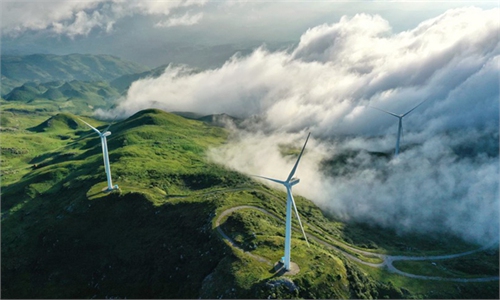
'Low carbon' tech under spotlight at import expo in Shanghai. Photo:Li Hao/GT
German businesses are eagerly expecting proposals amid the ongoing two sessions that are highly related to China's efforts to reduce carbon emissions by encouraging low-carbon technology and products.
.
Carbon neutrality or low carbon have become key phrases that appear frequently in proposals from deputies to the 13th National People's Congress and members of Chinese People's Political Consultative Conference.
Xia Fuliang, president of Evonik Greater China, told the Global Times that "green transformation has become a core concept of China's high-quality development. It gives a new impetus to economic growth and closer international cooperation, thus unleashing huge market demand for related products and solutions."
The German chemicals group said it is generating 37 percent of sales through products and solutions that come with better sustainability benefits. "We will continue to strengthen product offerings in China," Xia said.
It is enhancing local research and development capabilities to support emerging industries including electric vehicles, 5G, renewable energies and healthcare, among others.
Jeffrey Lou, president and chairman of BASF Greater China, told the Global Times that "climate change is a complex challenge that calls for the commitments of all stakeholders along the value chain, private or public. Therefore, we look forward to proposals related to government-level incentives on carbon reduction, by encouraging low-carbon technologies and products, an adequate supply of renewable electricity, and a more comprehensive carbon audit system."
The German chemical giant in 2019 launched in China the BASF Guangdong Verbund site - a $10-billion project that is the largest single investment in BASF's history. It is the first wholly foreign-owned project in China's chemical industry.
"By deploying cutting-edge technologies and by using renewable electricity where possible, BASF is building the site into a role model for sustainable production with an estimated 60 percent less carbon emissions compared with a conventional petrochemical facility of similar scope," Lou said.
As the first implementation year of the 14th Five-Year Plan (2021-25), 2022 is a turning point for China to combine industrial modernization and low-carbon development. Both themes are important for Roland Berger's clients domestically in China and multinational alike, Denis Depoux, Roland Berger's global managing director, told the Global Times.
"China set very ambitious objectives, even in the context of economic instability. As an example, in the medium term, the convergence of energy security and supply, and climate performance will require innovative technology and new business models. Roland Berger is supporting our clients to move swiftly to renewable energies, and innovative business models," said Depoux.
China will move in an orderly way toward the dual carbon goals of peaking carbon dioxide emissions by 2030 and achieving carbon neutrality by 2060, according to the government work report delivered by Chinese Premier Li Keqiang on March 5.
The country will pursue a low-carbon energy transition, continuously improve the environment, and push green and low-carbon development, it said.
"As we have seen, 2022 started in a dramatic way and the global macro environment is becoming increasingly unstable and complicated. The key word I retain from the government work report is stability," said Depoux.
He noted that China now is in the critical phase of deep transition to "high-quality development," and "low-carbon development," so stability is the basis to proceed with the transitions.
Chinese authorities in January unveiled a master plan on boosting the green transformation of consumption in key areas. It said that green consumption modes will prevail by 2025, and it called for efforts to raise public awareness of green consumption, curb extravagance and waste, and enhance the market share of green and low-carbon products.



